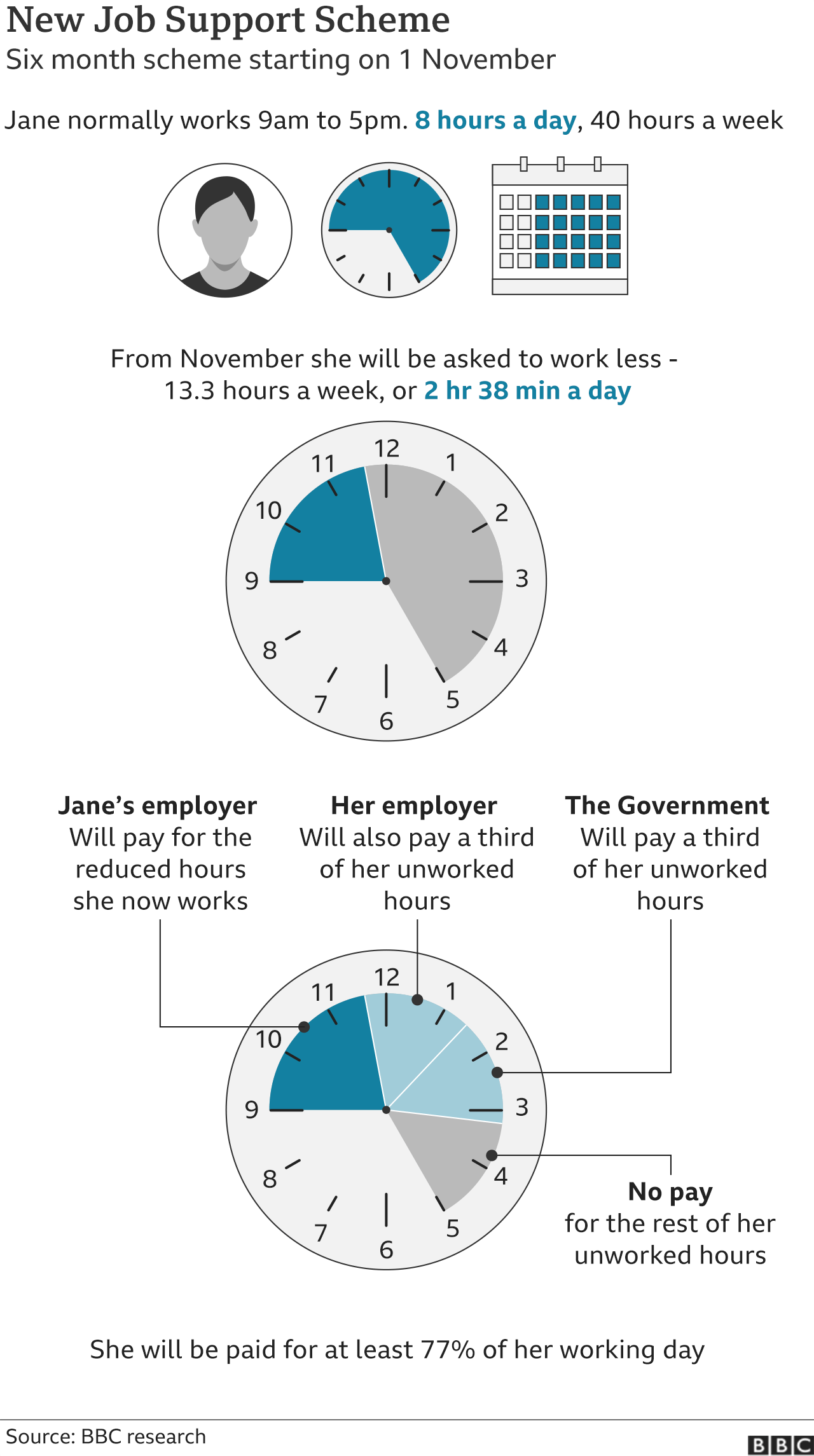The embattled UK hospitality sector has given chancellor Rishi Sunak’s latest job retention scheme a lukewarm reception, saying the new wage subsidy does not go far enough.
UK Hospitality, a lobby group representing British pubs, clubs, restaurants, and bars, said it wanted industry-specific help.
Boss Kate Nicholls said she wanted the government to pick up the full cost of unworked hours.
The reaction came after Sunak announced in the House of Commons that the government’s furlough scheme will end on 31 October.
It will be replaced by a wage subsidy scheme that will have employers paying the bulk of worker wages, so long as staff members are working at least 30 percent of usual hours.
Nicholls said the government covering two-thirds of part-time staff wages “would be a relatively low cost for a huge reward for our workforce”
Instead, she suggested “full support to sustain people in their jobs during what could be a bleak winter for hospitality”.
It means staff working for employers not already back up and running may face redundancy as they will be ineligible for the scheme.
The financial support from the government comes after it increased restrictions on social gatherings, return-to-work guidance, and a shortening of the pub and restaurant hours, which Nicholls called “a hammer blow” to the industry.
From tonight's pubs, bars and restaurants must close their doors from 10pm each night.
At an afternoon press briefing, Sunak hit back at the assertion that certain hospitality job losses were simply a “price to be paid” of coronavirus restrictions.
The chancellor also said the government had already provided industry-specific help for the hospitality sector, alluding to the successful Eat Out to Help Out scheme in August.
“Everyone in the industry isn’t currently paying business rates, small businesses have been granted grants of £10,000 and £25,000, there were specific initiatives over the summer, and a VAT cut, which has just been extended,” Sunak said.
“There’s been a considerable amount of support for that industry and they can still take up this new policy”.
VAT cut extension
UKHospitality did back Sunak in extending the 15 per cent VAT cut for the hospitality sector to March.
Nicholls said: “Things were looking grim for our sector yesterday and we were desperately hoping for some good news.
“We urge him to engage with the trade on specific measures to keep people in work.”
However, the British Beer & Pub Association said: “The VAT cut extension on food and soft drinks will help our sector and it is great to see the Chancellor answer our urgent call for this. However, the extension is only for six weeks and only takes us through to the end of the current restrictions – it needs to be much longer to help our sector recover.
Sunak had earlier unveiled his Winter Economic Plan in the Commons, where he said: “The primary goal of our economic policy remains unchanged – to support people’s jobs – but the way we achieve that must evolve… I cannot save every business, I cannot save every job.”
Chancellor Rishi Sunak has said it is "impossible" to predict how many jobs the government's new wage subsidy scheme will save.
The scheme, set to replace furlough, will see the government top up the pay of people unable to work full time.
It aims to stop mass job cuts after the government introduced new measures to tackle a rise in coronavirus cases.
Mr Sunak said he hoped the plan would "benefit large numbers", but he could not say what job is "viable or not".
Under the Job Support Scheme, if bosses bring back workers part-time, the government will help top up their wages with employers to at least three-quarters of their full-time pay.
It will begin on 1 November and last for six months.
How will the Job Support Scheme work?
Under the scheme, the government will subsidize the pay of employees who are working fewer than their normal hours due to lower demand.
Employers will pay for hours actually worked. And then the government and the employer will between them cover two-thirds of the lost wages. But only staff who can work at least a third of their normal hours will be eligible for the scheme.
The payment will be based on an employee's normal salary, with the government contribution capped at £697.92 per month.


Why is the government doing this?
Mr Sunak described the scheme as a "radical new policy", designed "to help protect as many jobs as possible [and] keep people in part-time work rather than laying them off".
However, he said it would only support "viable jobs" - as opposed to jobs that exist because the government is continuing to subsidize the wages.
"It's not for me to sit here and make pronouncements upon exactly what job is viable or not but what we do need to do is evolve our support now that we're through the acute phase of the crisis," Mr Sunak said at a press conference after the scheme was unveiled.
"We obviously can't sustain the same level of things that we were doing at the beginning of this crisis."
How many jobs will this save?
The BBC understands that the Treasury is estimating that anywhere between two and five million people could be covered by the new Jobs Support Scheme.
However, the chancellor told a press conference that he would be "lying" if he tried to give precise numbers but he said that some forecasts for unemployment "don't make for good reading".
Nearly three million workers - or 12% of the UK's workforce - are currently on partial or full furlough leave, according to official figures. The current furlough scheme ends on 31 October.
The government's contribution to workers' pay will fall sharply compared with the furlough scheme. Under furlough, it initially paid 80% of a monthly wage up to £2,500 - under the new scheme, this will drop to 22%.
"The primary goal of our economic policy remains unchanged - to support people's jobs - but the way we achieve that must evolve," Mr Sunak said.
"I cannot save every business, I cannot save every job."
 GETTY IMAGES
GETTY IMAGESHow much will it cost?
The scheme will cost the government an estimated £300m a month. Companies who use it can also still claim the Job Retention Bonus, where the government pays £1,000 for every furloughed employee who comes back to work until at least the end of January.
Mr Sunak said a similar scheme for the self-employed would be available.
Who does it help?
All small and medium-sized businesses will be eligible for the scheme but the larger businesses will only qualify if their turnover has fallen during the crisis.
It will run for six months starting in November and be open to employers across the UK even if they have not previously used the furlough scheme.
Employees must be in ''viable jobs" to benefit from the scheme. Those in industries currently closed - such as nightclubs - may lose out as there isn't any work.
 GETTY IMAGES
GETTY IMAGESWhat do businesses think?
Business lobby group the CBI welcomed the government's plan.
"It is right to target help on jobs with a future, but can only be part-time while demand remains flat. This is how skills and jobs can be preserved to enable a fast recovery," said CBI director-general Dame Carolyn Fairbairn.
However, Torsten Bell, chief executive of the Resolution Foundation think tank, said that the new jobs scheme on its own "will not encourage firms to cut hours rather than jobs because the one-third employer contribution means it is much cheaper for firms to employ one person full-time than two people part-time".
He warned that the £1,000 Job Retention Bonus firms would receive for retaining workers at the end of January, combined with the new scheme could create a new "cliff-edge" for job cuts.
"We've now got a big incentive for firms to retain workers part-time until you qualify for the bonus."
Labour, meanwhile, said it would support any measures to safeguard jobs but accused the government of acting too late.
 GETTY IMAGES
GETTY IMAGESWhat about workers?
Tracey Sheppard is a cleaner at a leisure center in Essex who has been on furlough since the end of March. She said she hoped the new Jobs Support Scheme will help her, but there are no guarantees.
"They're a very big company that I work for … but I don't know whether they'd be able to afford to keep me on… I just don't know," she told the BBC's World At One.
She said she feels "frightened" because her family only recently moved to the area and this is the only job she can fit in around childcare.
"I've just heard nothing [from my employer]. The last time I heard from them was the beginning of lockdown."
What else did the chancellor announce?
A cut in VAT for hospitality and tourism companies will also be extended until March. The cut from 20% to 5% VAT - which came into force on 15 July - had been due to expire on 12 January next year.
However, the Food and Drink Federation said this and the new jobs plan did "not go far enough" in helping the industry which has been hit by the government's new restrictions to stop coronavirus cases from rising.
What about loan repayments?
Mr Sunak also announced that businesses that have borrowed money through the government's loan scheme would be given more time to repay the money.
The chancellor said that small businesses who took out "Bounce Back" loans can use a new "Pay as You Grow" flexible repayment system. It means borrowings can be repaid over 10 years instead of the original six-year term.
The longer repayment time also applied to small and medium-sized firms who borrowed under the Coronavirus Business Interruption Loan Scheme.
Businesses will also have more time to apply for these loans, as well as the Coronavirus Large Business Interruption Loan Scheme and the Future Fund. Application dates for the various schemes had been due to end in October and November.

Will the scheme work?
The new jobs support scheme is a fraction of what we have seen over the past few months and is concentrated on those deemed to be in "viable" jobs. It cannot prevent a sharp rise in unemployment in the coming months in "non-viable" jobs.
Indeed, the economic impact of this package of several billion pounds is likely to be far outweighed, even by this week's announcement that the UK faces a six-month "new normal" of social restrictions.
The Treasury has extended the bridge of support it put in place in March to cover the next six months.
But the new scheme requires everybody to chip in. That will be too much for many employers. We are about to find out just how many.
London loses allure for jobseekers as Covid hits city businesses https://t.co/eXs3MtMBw2 pic.twitter.com/BSfALeEPnN
— Bloomberg (@business) September 25, 2020

